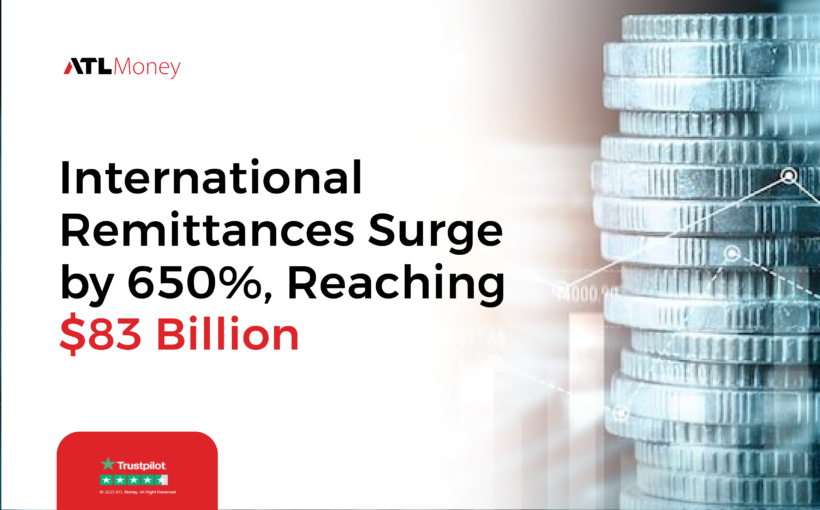International remittances have seen an unprecedented surge, skyrocketing by 650% to reach a staggering $83 billion. This surge highlights the critical role that remittances play in the global economy, particularly in supporting families and contributing to the economic stability of recipient countries.
This time we delve into the reasons behind this surge, its impact, and what it means for the future of global money transfers.
The Surge in Numbers
The dramatic increase in international remittances to $83 billion represents a significant shift in global financial flows. This surge is attributed to several factors:
Economic Recovery Post-Pandemic: As economies worldwide recover from the COVID-19 pandemic, many migrant workers have resumed work, leading to increased remittances. The pandemic had initially caused a dip in remittance flows due to job losses and economic uncertainties.
Technological Advancements: Advances in technology have made sending money abroad easier and more accessible. Digital platforms and mobile wallets have revolutionized the remittance industry, allowing for faster, cheaper, and more secure transfers.
Increased Migration: Global migration continues to rise, with more people moving abroad for better opportunities. Migrant workers send a significant portion of their earnings back home to support their families, contributing to the surge in remittances.
Impact on Recipient Countries
The surge in remittances has profound implications for recipient countries, particularly those in the developing world:
Economic Stability: Remittances provide a steady flow of foreign currency, which helps stabilize the economy. This is especially important for countries with fragile economies that rely heavily on remittance income.
Poverty Reduction: For many families, remittances are a lifeline. They help cover basic needs such as food, education, and healthcare, significantly improving living standards and reducing poverty.
Developmental Impact: Beyond meeting immediate needs, remittances also contribute to long-term development. Funds sent home can be invested in small businesses, infrastructure, and community projects, fostering economic growth and development.
Challenges and Considerations
Despite the surge, there are still challenges that need to be addressed to optimize the remittance process:
High Fees: While technology has reduced costs, traditional money transfer methods still incur high fees. This can significantly reduce the amount received by beneficiaries.
Regulatory Hurdles: Different countries have varying regulations that can complicate the remittance process. Ensuring compliance with these regulations while maintaining efficiency is a challenge for service providers.
Financial Inclusion: Access to financial services remains limited in many rural areas. Improving financial inclusion is essential to ensure that everyone can benefit from remittances.
Future Outlook
The future of international remittances looks promising, with several trends set to shape the landscape:
Continued Technological Innovation: Ongoing advancements in technology will further streamline the remittance process. Innovations such as AI, blockchain, and enhanced mobile capabilities will make transfers even more efficient and secure.
Policy Improvements: Efforts to harmonize regulations and reduce barriers will facilitate easier cross-border transfers. Policymakers are increasingly recognizing the importance of remittances and are working towards creating more favorable environments for these transactions.
Sustainable Development Goals: Remittances play a crucial role in achieving sustainable development goals by reducing poverty and promoting economic growth. As such, they will continue to be a focal point for international development initiatives.
Conclusion
The 650% surge in international remittances to $83 billion underscores the vital role that these funds play in the global economy. With continued technological advancements and efforts to address existing challenges, the remittance landscape is set to become even more efficient and impactful.
For individuals looking to send money abroad, services like ATLMoney offer a fast, secure, and cost-effective way to support loved ones and contribute to global economic stability.
Ready to send money abroad easily? Try ATLMoney for a fast, secure, and cost-effective transfer experience.
